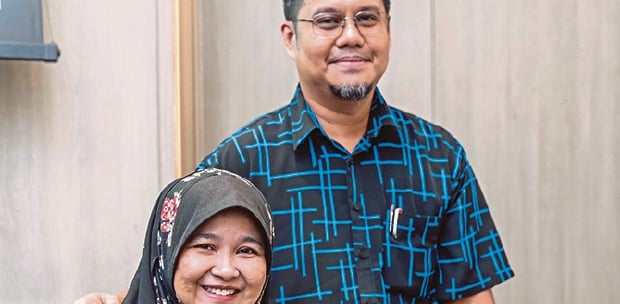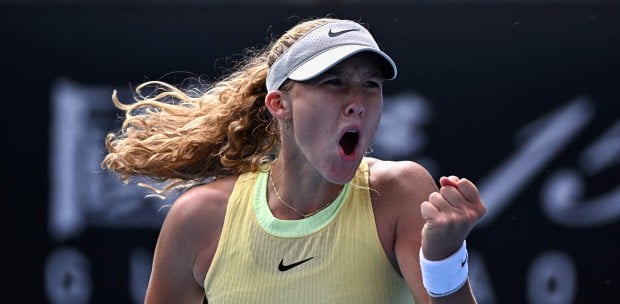WHEN she was a teenager, Tengku Puteri Raja Tengku Puteri Iman Afzan Al-Sultan Abdullah, 26, suffered from anxiety. She didn’t know what was wrong and didn’t ask for help, something she wished she had done.
The eldest daughter of Yang di-Pertuan Agong Al-Sultan Abdullah Ri’ayatuddin Al-Mustafa Billah Shah grew up learning about what afflicted her, and so many others who were and are battling mental health issues, mostly in silence.
Having gone through that phase in her life and learning from that experience, she is determined to advocate mental health awareness more than ever before. She says it is necessary for mental health to be discussed without being stigmatised.
In an insightful interview with SYIDA LIZTA AMIRUL IHSAN, Tengku Puteri Iman Afzan talks about overcoming anxiety, helping young people build mental resilience and how society can be more empathetic
ON CHAMPIONING MENTAL HEALTH
Question: Why did you choose to champion mental health?
Answer: Mental health doesn’t get the attention it should. If you look at the statistics — and there is not enough on it — it shows that something must be done given that it’s a global epidemic, affecting one in four people, according to the World Health Organisation.
While mental health and clinicians work on it medically, I want to play a role in society by addressing it and making it part of our conversation. If I can play a role, big or small, in helping to formulate a response, or boost awareness about the importance of mental wellbeing, I would have achieved my goal.
Q: Why did you choose to be the royal patron of the Mental Illness Awareness and Support Association (Miasa)?
A: Miasa stands out compared with others because it’s a patient-led group. I feel that for the recovery of mental health patients, you need to be led by them because they know best.
Miasa involves patients in the delivery of mental health services and they have a more holistic approach. They are very proactive and are even planning to conduct suicide prevention training workshops in the near future, where attendees can learn how to spot the signs when someone is suicidal and what they should do.
Q: In your experience as Miasa’s royal patron, what is the prevalence of mental health given that it is often under-reported?
A: According to the 2015 National Health and Morbidity survey, almost 30 per cent of those aged 16 and above have mental health issues.
This is where psychoeducation is needed to tackle this group of young people before their mental health issues turn into illnesses.
There is a need to educate society about mental health for two reasons.
One, the mental health spectrum is wide, from depression and anxiety to bipolar disorder and schizophrenia, and there is a lack of understanding of these conditions among patients and those around them at school and at the workplace.
Second, there are those who, sadly, use mental health issues as an excuse not to get by in life or when things do not go according to plan.
We need to manage the narrative of mental health.
ON PERSONAL EXPERIENCES
Q: Tell us about the anxiety you suffered while growing up.
A: It started at 12 or 13. I didn’t know I had anxiety. But I knew something was off. I was constantly overthinking and nervous. I felt like I didn’t fit in and maybe that contributed to that too. I’m a sensitive person, but that’s just the way I am. Just because someone can take a mean comment doesn’t mean others can. It’s like your pain threshold — some people can handle more pain and others, less. People are built differently. But when you are young and fragile, that’s when you need to take care of your mental health the most and I realise that now.
Q: Have you witnessed someone close to you spiral into depression or anxiety?
A: When you are dealing with loss, it’s very easy to suffer from depression. My best friend, who lost her father very suddenly, nearly went into depression. We were not best friends then, but I felt the need to be there for her. So I was there, checking on her every day and I think that helped her a lot.
She felt like she wasn’t alone. When someone you know is going through a hard time, it helps to be there for them, whether it’s a message or a call. It’s a small gesture that goes a long way. Reach out to anyone who is in pain, no matter how big or small the issue.
ON MENTAL HEALTH AND THE YOUNG
Q: Do you think mental health among the young is worrying?
A: I think it’s a no-brainer that mental health issues among the youth is soaring. Many disorders — anxiety, for one — begin in childhood and adolescence, but the problem is that children don’t realise they have a mental disorder.
For prevention and early intervention, there must be a push for mental health education in schools, which includes mental health literacy among teachers for them to detect signs or red flags.
Q: The older generation often says that the younger generation is not resilient enough mentally, hence the soaring cases of mental disorders. Do you agree?
A: I think generally, the older generation doesn’t understand mental health issues or reasons behind them, so there is this disconnect. Perhaps today’s youths are less mentally resilient.
Our parents and grandparents were less spoilt when they were young. They grew up in an environment that was not as overprotective as it is today. I am often told that if things went wrong in the old days, people just got on with it.
In this sense, perhaps our attitude today lacks that kind of perseverance and willpower the older generation has. But it should be pointed out that we grow up and live in very different worlds.
The pressures today are different and everything you do can be out there for everyone to see via social media. Back then, having a few As was an achievement. Today, the pressure to score is immense and this puts a strain on the young.
Q: Do you think social media makes us suffer mentally?
A: Yes. Social media can often be used incorrectly. It empowers users to say what they would not say to other people’s faces. A teenager in Sarawak took her life after her Instagram followers voted for her to do so. How could you goad people to take their own life? Something harmless and innocent on social media — a holiday photo or a snapshot of an achievement — could turn into something negative if we start comparing ourselves to others. When you start doing that, you will never be happy. We forget that people curate their life on social media. They post only good and happy moments. Everybody goes through ups and downs. No one has it easy all the time.
Q: How can young people train themselves to be mentally agile?
A: Sticking to the basics is needed in moving from mental illness to mental wellness. Get enough sleep, drink enough water and eat a balanced diet. A good diet is very important for mental wellbeing. Also, playing sports and staying active will get your endorphins up and reduces the feeling of hopelessness associated with depression and other mental conditions.
Be kind to yourself. Surround yourself with good people and learn to say ‘no’ when you need time for yourself. I find that people often stretch themselves too thin nowadays.
We’re so connected that we are disconnected and even when we are offline, we’re not really offline. Managing stress is key.
This goes hand in hand with the availability of mental health support by counsellors, therapists, psychologists and psychiatrists.
ON REACHING OUT AND SHAPING A COMPASSIONATE SOCIETY
Q: Why do those with mental health issues find it hard to reach out for help?
A: Maybe because they are afraid of being judged because mental health is stigmatised and society may view you as weak for not holding yourself together.
I think this is always going to be the stumbling block in mental health. I cannot speak for the rest because the mental health spectrum is wide, but I find that those suffering will almost always say they are okay.
I should have asked for help, but I didn’t. How could anyone having anxiety, let alone a teenager, know that she is experiencing it?
A mental health issue is a disease of the mind. If you don’t address it when it is small, then it can grow and worsen.
Q: How can people overcome their mental health condition?
A: It’s important to have a great support system in your family or friends. Keep your circle small and always surround yourself with people who have good intentions.
My mum, Cik Puan Julia Rais, is my spiritual pillar and guide. I feel so lucky that I can talk to her about everything. From her, I learnt to build my resilience from the inside.
She taught me to be grateful always because the more grateful you are, the happier you become. She is a very spiritual person and being spiritual, I find, helps you a lot. She made me read Yasmin Mogahed’s Reclaim Your Heart and see things from a spiritual point of view.
Connecting yourself with nature helps too. When you go to the beach, for instance, you see the magnitude of nature and you realise how small you are in the bigger scheme of things and by extension, your problem is small too. But most importantly, do not be afraid to reach out and ask for help.
Q: How should society change or respond to be more receptive to discussing issues to pave the way for better management?
A: I don’t think it’s too much to ask for us all to be more open-minded, tolerant and kind to one another.
We, as a society, can be judgmental and we need to practise acceptance so that sensitive issues like mental health can be discussed openly, maturely and objectively. We shouldn’t look down on those who suffer from mental health issues.
For example, we tend to dismiss those suffering from mental illness as not having enough faith, or as being weak or spoilt. While religion and self-esteem are important and do play an important role in managing mental health, there are other avenues to address mental issues, such as counselling or therapy.
We must learn to listen more and be more compassionate to anyone going through a hard time.
Everyone is fighting his battle. People may appear happy on the outside, but not everything is what it seems.





